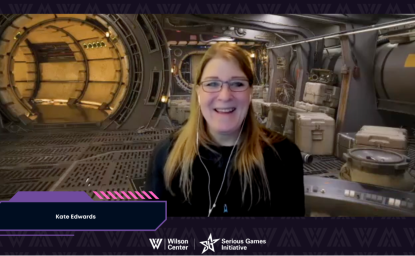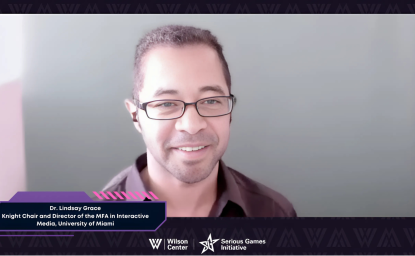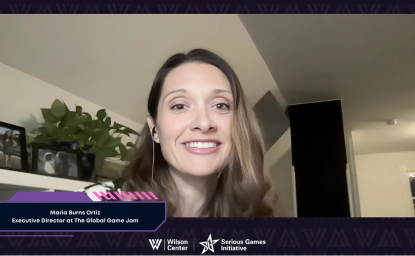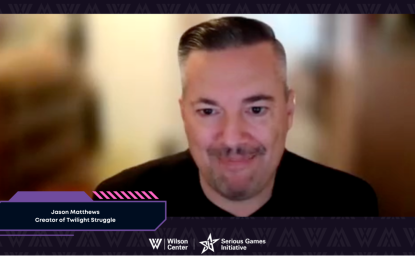Elizabeth Newbury:
Welcome to another video from the serious games initiative at the Wilson Center. We are so excited to have you back. Just a little bit of a rewind, the Series Games Initiative is a initiative at the Wilson Center, which is a nonpartisan Think Tank located in Washington, DC, and we focus on the topic of serious games. We both develop serious games and we also research, and we also get to talk to amazing people and convene them at the Wilson Center and virtually to talk about some of the leading issues in serious games and game based learning. The Serious Games Initiative is turning 20 years old, and so we thought this would be a really great opportunity. I see Tracy, you're shaking your head, but this would be a great opportunity to talk about sort of the past, the present and the future of serious games, both as a field and as a means of outreach and engagement. I'm joined today by Tracy Fullerton, and my first question is, if Tracy, if you wouldn't mind introducing yourself and telling us a little bit about how you orient towards serious games.
Tracy Fullerton:
Sure, you've already sort of introduced me, but, yeah, I'm Tracy Fullerton. I am a professor at USC games. I am also the Director of the USC Game Innovation Lab, and I'm a designer, I'm a writer about games, I'm an educator, and I'm a player of games, and I think, you know, probably the best way of talking about how I orient towards the field is that, I suppose I'm one of the people who strongly believe, for A long time, that games are an important expressive field, that they can be some of the most important experiences in our lives when we play them, reflectively, when we play them, when we bring to them our full selves. And that the conversation around what games can talk about, what they can represent, how they can be a part, you know, play a part in civics, in culture, in arts, in education, these things are the The future, the potential of what games as a medium are and can be. And so I guess I'm one of those people who believes in trying to roll that boulder up the hill and and that is where I have been for more than 20 years, helping, I suppose, to try and push that conversation forward.
Elizabeth Newbury:
That's amazing. And for those who aren't familiar with your portfolio, would you mind listing some of the game titles that you're known for?
Tracy Fullerton:
Sure, I think most pertinent to this conversation would be, of course, Walden, a game, which is a game where you play as Henry David Thoreau, it's an independent experimental game. It's available both as a commercial game, which is a six-hour long open world experience, and also as a set of educational modules for free to teachers, where they can bring them into their classrooms and have 20 to 30 minute short experiences around some of the core themes of the book Walden. And, of course, also a collaboration with Bill Viola, the media artist, The Night Journey, which is a game about the spiritual journey, and that is also a console and PC game. I've done also a number of other educational games, and, you know, before going into academia, Many different kinds of experimental play games, multiplayer interactive television, some of the earliest casual games that were multiplayer games, games for themed entertainment and so forth and so on. I've been a game designer for over 30 years and so, you know, I guess I have a broad perspective on what play is and the kinds of playful experiences that we can that we can create, that we can share with one another.
Elizabeth Newbury:
That's great. It actually kind of segues into my my next question, which is thinking back, when you were getting started in the field, or when you were getting started with these educational based games, can you describe, sort of what the field was like at that point? What were the catalysts or the spark of interest in creating these pro social educational games like you described.
Tracy Fullerton:
Sure, and I think, you know, to kind of contextualize my interest in this, you have to know a couple of things. One is that, you know, early on in my life there, there wasn't somebody drawing a line between different types of games. So, when I went, ironically, to the bookstore to look for games, you know, there were games like Balance of Power, Chris Crawford's famous Balance of Power, you know, sitting on the shelf, next to flight simulator. And nobody said, Oh, buy this kind of game or buy a different kind of game. All games were open territory for exploration. And I would say that something like, for example, Balance of Power was something in my early days that sparked in me an understanding that games could be about something more than, you know, Space Marines. Not to say the Space Marines aren't super fun, but that it could, that we could address real world topics, and really, you know, as a child of the Cold War, make us think about those topics in dynamic and really interesting ways, you know, as I tried over and over again in that game to solve that particular balance of power, and failed over and over again, and started to understand that was a really complex problem. So that's one sort of things to understand contextually, is that for me, it goes back up very far. But then I would say that, you know, in this discussion, we're talking about something that happened around 20 years ago. And around 20 years ago, that was a time that I actually went to academia. Left sort of the game industry proper, went to academia, started the game innovation lab started having students and discussions around making new types of games. And I remember having a conversation with Susana Ruiz, whose thesis project Darfur is Dying, was a very early, you know what we call serious game?
Elizabeth Newbury:
Yeah. I remember playing it.
Tracy Fullerton:
That caused a lot of controversy when it first sort of came out. There were articles about it saying, you can't, this is terrible, you cannot make a game like this. It's a horrible thing to make a game about. Well, yeah, it is. It's a horrible thing to have happen in the world. And yet, as people started playing it and having conversations about it, understanding that it had calls to action to it, sort of, you know, to say, write to your congressman about aid to Darfur, that there was a lot of thought going on in a project like this, and there was a lot of potential. As that started to happen, the conversation around games like that changed, and specifically around that project, it went from being, you know, I remember Susanna coming to me and, like tears, saying, oh, oh my God, Wired has written this thing about us that we shouldn't be banned, basically. And then, of course, the conversation started to shift as you had communities growing up of developers and, stakeholders who wanted to make games in these areas. So for me, that was a catalyst moment. And around this time, 20 years ago, that this started to happen.
Elizabeth Newbury:
Yeah, for those who haven't had the experience of playing that game, because I viscerally remember playing it. It really did, you were allowed to, like, select a cast of characters. When I say characters, I mean representations of people who were in camps at the time, and I remember always struggling. I would always pick one of the little kids and I mysteriously not be able to execute the mission goal of getting water for the camp, or something along those lines.
Tracy Fullerton:
That was seen.
Elizabeth Newbury:
Yeah, yeah. I don't confess to being a really good gamer all the time, but it's a really canonical game in the sense of it, highlighting a very serious issue through play. So I it's really interesting to hear that sort of history of the tension.
Tracy Fullerton:
Those characters were chosen specifically because they were the types of people, who were being kidnapped and, you know, put into these camps, or even having worse fates, right? And so you would find out what would happen when they would be captured, based on how old they were, what gender they were, things like that. And it was a, you know, really shocking moment when your character would be captured, because the characters were always captured, pretty much.
Elizabeth Newbury:
Having that sort of high risk, right, the RNG not in your favor, or the randomization of the game in your favor for it really does kind of bring those points home. So thinking beyond the legacy of those sorts of games in your own games. Fast forwarding to today. How far do you think we've come as a serious games, for example, I don't think there's a lot of tension as much right now in the topics that some of these games have covered.
Tracy Fullerton:
So yes and no, actually, so I would say the kinds of media that in what we now mostly call, say, impact games, right? These are generally positive, because the media will say, Oh, wait, isn't it wonderful that you can make a game about this, about that, we can make a game about archeology, and isn't it great that students can learn from it, or whatever? The thing is, like, they discover every every article is always still to this day, it's like they've discovered serious games, or games for impact, like, Oh, we've never heard that you could do this. So that's different, because it's almost always a good and positive thing in their minds, but it is still there's this conversation like, Oh, we didn't realize games could be done this way. So to me, there's this frustration because the conversation hasn't accelerated enough to the point where it's taken for granted that we can, of course, make games about interesting, complex, difficult subjects, and that the experience of play can involve difficult emotions and situations, that's interesting, that it's interesting to play our way through those kinds of situations. I think that should be a given, and then our conversation should should go beyond that. So at this time, you know you're not going to have the same kind of reaction that I talked about with Darfur is Dying, but you will still have a sort of what I would say, almost naive or pretense at naivete about the fact that games can do this, because to this day, in the general sort of Zeitgeist, games are still thought of as a medium for children.
Elizabeth Newbury:
Yeah, now I have to consistently explain what the Serious Games Initiative is, and that we also make games for adults who to learn about policy issues.
Tracy Fullerton:
And it's ironic, isn't it, because so many adults play games.
Elizabeth Newbury:
Yeah, we're all skewing older as far as a demographic of game players. So if you think about what else has shifted today, is there anything else that stands out to you around the field?
Tracy Fullerton:
Yeah, I mean, I think what's great is games that are in the wider spectrum, that sort of, you know, have commercial success to an extent, but that also carry the themes of impact, right? That they're trying to address more interesting themes, right? You know, we are starting to see things like different characters and storylines that address more interesting social issues, right? I think specifically of things like the Life is Strange series, which, it's interesting. It's, you know, this is a, these are, you know, triple A titles, but they, they have the stance, almost, of indie games, in the way that they, you know, deal with their characters, their scenarios. They're always dealing with really interesting, topical issues, and not on the nose, not like, this is a game about, you know, race relations in America. If you look at something like, Life is Strange, too, which the main characters are two boys. They're mixed race. Their mothers from the US, their fathers from Mexico, right? And they're kind of on the run, making their way through a hostile modern America. That's not open to these young, you know, these young mixed race boys in the situation that they're in, and they're dealing with problems with power and police and prejudice just on the part of people that they meet. The game is not about that. The game is about these boys and their journey and their relationship to each other, to their father, their mother, their situation, right? But it really brings up some beautiful moments of, just as you're playing it, you're like, oh, wow, these people are being really prejudiced to us, you know? And as you play as that character, you may never have experienced that yourself, right? And so it's a wonderful window into that world. So I that's just one example. I think there are a lot of modern games that are reaching out beyond just the sort of standard characters, standard scenarios, standard story lines. And they're, they're, they're large scale games, but they are saying, Hey, you don't have to just do the same old fantasy. We can also include some thoughtful ideas here, because we have an audience and we can talk about these things. So that's exciting to me. It's exciting to me because it doesn't, you know, kind of like going back to my initial statement, it doesn't, sort of cordon it off and say, This is the serious games section. It's saying, hey, games can have serious ideas in them, all games.
Elizabeth Newbury:
Yeah, when you were describing, by the way, going to the bookstore, I was remembering going to places like Best Buy and the educational games were kind of mixed in with whatever other game you wanted to blend, as far as the modern triple A's or other sort of industry leaders getting into this, does this sort of, in your view, widen the spectrum of what a serious game can be?
Tracy Fullerton:
Yeah, I mean, you know, I hope, I mean, to me, the perfect world is where we no longer need that term. Quite frankly, it's like saying, I suppose it's a little bit like saying serious literature. I mean, isn't that a little redundant, right? Isn't the whole point of literature that it takes on serious ideas and and themes, right? That's why I hope someday that we just talk about games, right? We talk about games, and some games will have more interesting themes than others, but we'll talk about them, and we won't have to say whether it's dealing with a serious topic or a topic that hopes to make impact or not, right?
Elizabeth Newbury:
Yeah, yeah, that's a really good goal for the field. Is there any other hopes that you have for serious games? Or what you would anticipate is the next big thing?
Tracy Fullerton:
My hopes are perhaps larger than just games, but I think that one of the core problems facing games is not unique to games. It's one of the core problems facing games is that our own audience, some parts of our own audience, adamantly don't want games to grow, and I think that's a shame, because anyone who loves games should want them to grow. Anyone who loves playing interesting things should want new interesting things to play. So I think that, you know, we're in this moment where it's very difficult to talk about wanting games or media of any kind to change and grow and to take on new, interesting, more complex ideas, because there's this resistance that comes from a core part of the audience, and that resistance frightens the people who have the money to fund such things. So for me, I think that's a barrier. It doesn't mean we shouldn't stop trying. I think it means that we should double down, and we should drive in harder, because those people, whether they know it or not, need these conversations more than anyone else. They need to be in conversations about serious topics, and they need to learn how to be in conversations that include diverse voices so they can hear other opinions.
Elizabeth Newbury:
On that note, with the idea of looking to the future of serious games, are there any words of wisdom you would have to the the young Tracy's out there, or the young developers who are trying to get those big thoughts into games?
Tracy Fullerton:
Yeah, I would say ironically, start small. I think that, you know, we, 10, myself included, to have big ideas. And think that that our big ideas need big execution, and unfortunately, that means big risk when you're talking about getting to audience. So my advice, which would have gone to the young Tracy would have been, start smaller. You know, don't spend 10, 15 years on one game, which is what I did. Maybe smaller games, shorter time periods.
Elizabeth Newbury:
Yeah, and maybe focus topics, right too, because, like, Walden is such a broad atmosphere, but there's a lot of agility in having a small game.
Tracy Fullerton:
I wanted to make that game the way it was, and there's no way you would have convinced me to make it another way, but get you're asking me to give advice. And so that's the advice I would give my students. And they'd probably take the advice as well.
Elizabeth Newbury:
Thank you so much, Tracy, for your time and your wisdom for the young Tracy's out there, as it were. For anyone else, we'll link a lot of the information, either down below, if you're on YouTube or wherever it is on social media, that's appropriate, linking to some of Tracy's portfolio, linking to the a little bit more about us at the serious games initiative, and stay tuned for our next interview. Thank you so much for joining.
Tracy Fullerton:
Great thanks for having me.











